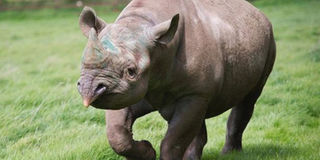Black rhino dies on the way to Tanzania, cause unknown

Zambezi, the male black rhino aged 17, who died while being transported from Kent to Tanzania. PHOTO | COURTESY | THE ASPINALL FOUNDATION
What you need to know:
- Zambezi was born in captivity at foundation-owned Port Lympne in 2002 and sired three calves.
- He was being flown from Lydd airport to the Grumeti Reserve, as part of a programme to repopulate the Serengeti.
- Mr Damian Aspinall, of the Aspinall Foundation, said the foundation had "successfully returned eight black rhinos to their native homeland".
- The rhino was accompanied by a keeper from Port Lympne and a vet from Africa, according to the foundation.
A black rhino died while being flown from a nature reserve in Kent to Tanzania, where he was due to be released into the wild.
The 17-year-old male, called Zambezi, was being transported from Port Lympne in Hythe to the Serengeti.
The species is critically endangered, with a population of about 5,600.
The Aspinall Foundation said the cause of death was unknown, but vowed to investigate to see if lessons can be learned.
CAPTIVITY
Zambezi was born in captivity at foundation-owned Port Lympne in 2002 and sired three calves.
He was being flown from Lydd airport to the Grumeti Reserve, as part of a programme to repopulate the Serengeti.
The foundation had documented his journey on social media, posting photographs of Zambezi being loaded into a crate and placed on board the plane.
One follower said they were "heartbroken" by the news of his death, with another adding: "I hope he didn't suffer."
INQUIRY
The rhino was accompanied by a keeper from Port Lympne and a vet from Africa, according to the foundation.
Its chairman Damian Aspinall said he was "shocked and devastated by the loss".
He added: "We do not yet know what caused his death, but we will, of course, carry out every examination and inquiry possible to see if there are lessons to be learned."
Mr Aspinall said the foundation had "successfully returned eight black rhinos to their native homeland", adding:
"It is my firm belief that these animals do not belong in captivity, our long-term goal is to see all zoos phased out or, if they're not, to see them truly doing conservation work."





